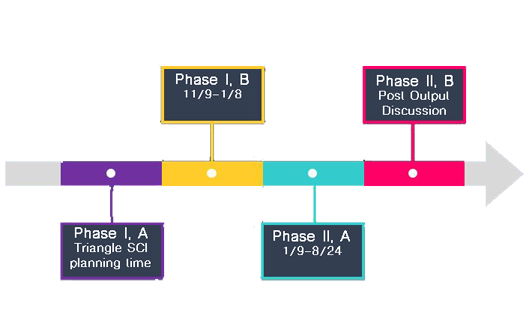Theory
Because our individual projects include podcasts, live radio performance, video games, live stream Traversals, and Twitter chats, we turn to the notion of "virtuality" as suggested by Vince Dziekan in his book Virtuality and the Art of the Exhibition. Here he argues that virtual objects are those that are participatory, interactive, and experiential, which certainly our projects reflect. Furthermore, he argues that when we work with virtual objects, we can combine "stag[ed] virtual experiences" with "events that bring values, beliefs . . . into the public domain" [Dziekan 2012, 63]. A sense of liveness emerges from these objects, requiring us to approach the presentation of those objects as occurring in the "black box" associated with performance and action rather than a "white cube" associated with emptiness and neutrality [Dziekan 2012, 68].
Process
SCI is a catalyst for a kind of activated complex, of effervescent experience, of process. SCI IS method—creative, collaborative constraint—creating the conditions for scholarship as participatory, interactive, and experience (PIE)
In the diverse, multimedia methods that we brought to the table, we discovered a common ground we all value the experiential dimensions of scholarly communication and interactive storytelling that lean more towards activated complexes
- in participatory digital gamespaces and engaging electronic literature
- in podcasts and radio broadcasts that generate involved conversations with communities of listeners
- in twitter's provocative scroll of reflexive textual presentness
- in open access advocacy and a desire to overcome siloing and privilege
Stories are ways of refining, processing, essentializing, crystallizing and communicating experience. Our team's intention is to promote the diversification and pluralization of multimedia and digital storytelling venues, to open up forms of scholarly communication to inclusive and open dialogues, to recognize stories as not just reportings and archives, but as communicable experiences. Instead of hiding the "messy part" in polished deliverables, become more confident in making the process open, inclusive, plural, energetic—and (maybe moreso in our group) unpredictable.
In form and content, we are working on a collection of storytelling outcomes (various forms of digitally framed and distributed storytelling opportunities) that, together, embody and communicate the "spirit" of this SCI experience to broader publics---sharing stories in ways that reconstitute THIS experience, THIS method, that invite publics into the activated complex of process in more diverse ways than just publishing articles and waiting for citations.
Our media, method and message are the same. We want to share stories and story environments that reconstitute and catalyze diverse and inclusive processes.
![]() Learn more about our process
Learn more about our process![]() Learn more about our team
Learn more about our team 





